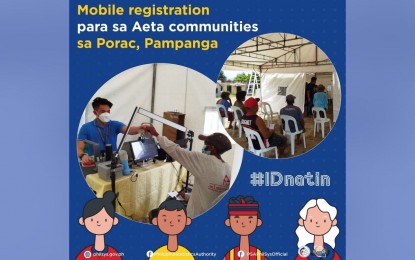
MANILA – Indigenous Peoples (IPs) groups can now participate in the Philippine Identification System (PhilSys) registration process as the Philippine Statistics Authority (PSA) kicked off onsite registration for Aetas in Porac, Pampanga.
The PSA, in coordination with the Pampanga local government, opened registration centers in Barangays Camias, Villa Maria, Inararo, Diaz, and Sapang Uwak, all operational since May 18.
The PSA said in a statement that the move is part of the government's goal of pushing for inclusivity.
"The registration aims to bring the Philippine Identification System closer to Aeta communities," the statement on Thursday read.
One of the key benefits of holding a Philippine Identification (PhilID), or national ID card with a 12-digit PhilSys Number (PSN), is having a valid proof of identity that can be digitally verified for public and private transactions.
The PSN will allow a secured and reliable verification of identity.
The PhilID can also be used in processing documentary requirements in schools, such as during enrollment and applying for scholarships.
On October 12 last year, the PSA began pre-registering five million heads of low-income households identified by the Department of Social Welfare and Development through a house-to-house process.
Due to the health crisis, the PhilSys registration was done in three phases — collection of demographic information, validation of supporting documents and capture of biometric information, and release of the PhilID cards.
The PhilSys online portal for Step 1 registration was opened on April 30 to encourage more to avail of the PhilID.
The government targets to register 50 to 70 million individuals this year and sign up the majority of the adult population by mid-2022.
Registration and delivery of PhilID cards are free of charge.
Signed into law by President Rodrigo Duterte in August 2018, Republic Act 11055, or the Philippine Identification System Act, aims to establish a single national ID for all Filipinos and resident aliens.
The national ID shall be a valid proof of identity that shall be a means of simplifying public and private transactions, enrolment in schools, and the opening of bank accounts.
It will also boost efficiency, especially in dealing with government services where people will only need to present the PhilID during transactions. (PNA)
